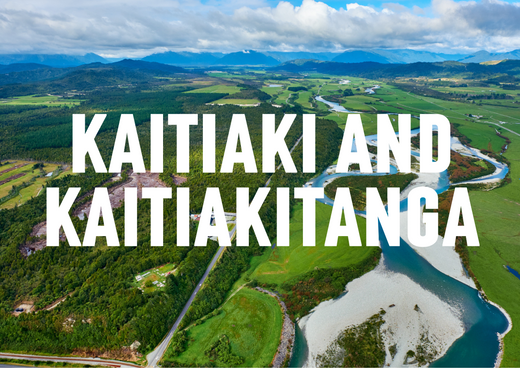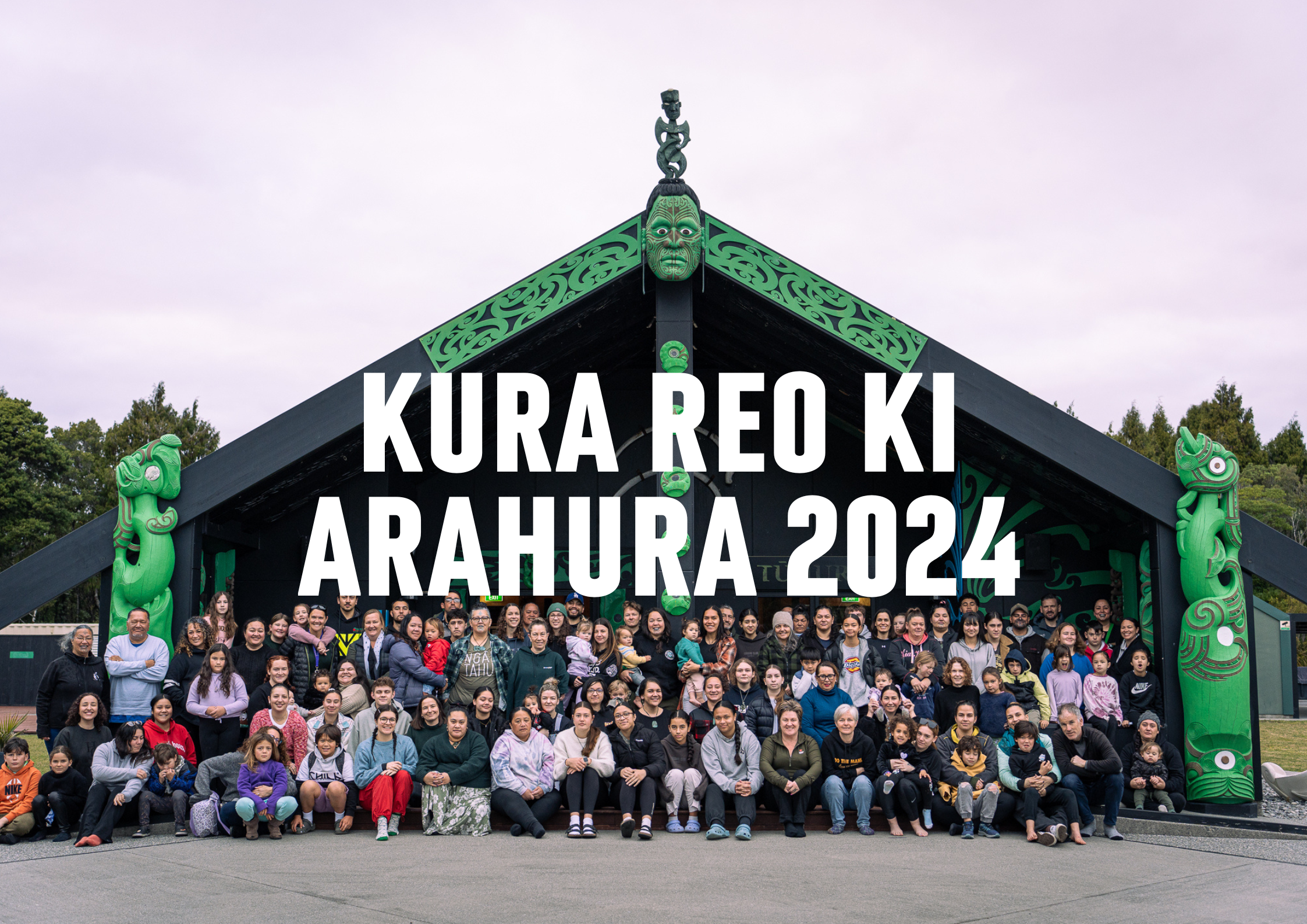Our hoa Vicci has shared some reflections and whakaaro about her journey to connect with te ao Māori as a Tangata Tiriti.
Whuuu! It’s been a year, and as things ramp up and ‘slow down’ simultaneously at this point of 2024, I’ve been reflecting on my journey, my learnings, and my relationship with Te Ao Māori.
Nō Kotirana ahau. I’m from Scotland and I moved here (to Ōtautahi, on the whenua of Ngāi Tūāhuriri, Ngāti Irakehu and Ngāi Te Ruahikihiki) as a tween, but I never felt a sense of belonging and I always had a longing for home. My mum and dad kept me coming back to this far off land - and eventually my tāne and now my three tamariki Māori have me locked in to living here for the indefinite future. Ahhhhhh! (Jokes - nōku te whiwhi!)

Vicci & her whānau
The birth of our mātāmua marked my intentional effort and commitment to learning about te ao Māori, and in turn about Aotearoa, from perspectives not commonly shared in educational and social settings of the early 2000’s.
She’s just turned nine now, and in those years I can see my growth from a well-intentioned but essentially privileged, able-bodied, cisgender, straight, high-achieving white girl, to someone who now recognises my biases, acknowledges my privileges and commits each day to do better. I introduce myself as a Tangata Tiriti; an aspiration, a commitment and a personal reminder that I can have a place on this whenua. Through this gift of a ‘label’, I am finding community and ways of belonging in relationship to the whenua, and with tāngata whenua.
It started with te reo. I would sit for hours on the couch feeding my newborn, watching Tōku Reo (a TV show made by Kura Productions based on Te Whanake language course by Prof. John Moorfield), finding a whole online world of resources to learn te reo Māori. I remember following each ‘a’, ‘e’, ‘i’, ‘o’, ‘u’ aloud, and learning words like ‘rā’ and ‘whare’ - things I can now be quick to take others’ understanding for granted. I was so focused on the reo for my pēpi, that it took me three years into the journey to begin to realise the true extent of this taonga that was being so generously shared with me.
Leaving my sofa and finding reo speakers and learners (Māori and tauiwi alike) in the community helped me to learn that I could do as much harm with this language as I could do good, if I was not careful in how and with whom I used it. I felt this in visits from whānau who had lost their reo, due to a range of whānau experiences but mostly being disconnected from their whenua, their whānau, their hapū and having their language beaten out of them. They are whānau from the generation when so many chose to protect their tamariki from violent colonial practices by not using te reo in the home.
My whole body would tremble as I pronounced Māori words correctly (or as correctly as I could) in front of my whānau Māori who had whakapapa or lived experience of places, but would be confused about the place I was talking about because of my whakahua. I think it’s important to listen to your body - it wasn’t my place to be speaking te reo in ways that may make others feel confused, or ‘less’. Leave that for the mokopuna to return their language to their kaumātua. Also it’s a journey right? Nine years down the line, we’ve all grown, we all try to pronounce place names better, and I feel supported by my whānau in my journey with te reo Māori.
When I was hapū with our mātārua I signed up to learn te reo at Te Wānanga o Aotearoa. It felt like a big move, where commitment ramped up and suddenly there were assessments and assignments. It was a way of acquiring knowledge that felt familiar and ‘proper’, like I could say ‘I was a student/I was studying’… whatever that means. Maybe it felt like I was taking it ‘seriously’, I’m not sure. These are all things that didn’t really impact why I was learning te reo, but seemed to affect how my Pākehā friends, family and associates viewed my journey.
Along with these less inviting aspects of Te Wānanga there was a wealth of new information, learning about things like whakataukī and whakatauākī. A friend offered that through these, I could begin to see part of a Māori world view and perspective. I enjoyed learning waiata (beyond the ones I sang with our pēpi), pūrakau, and stories about whakapapa. Some of them felt familiar from what my tāne had shared at home, and others felt like I was getting to know a whole new world - allowing me to see meaning, history and cultural practices in this land that I’d been living so blindly in. How lucky I felt. I was still so keen, I’d enjoy asking questions and trying to understand more. I learnt of the multiplicity of each kupu, few with a single meaning. Each new offering held space to allow for more. I love that!
As I continued throughout the year, I noticed our once-full class had less. Once a mix of Māori and tauiwi, but now white women dominated. Me. How much space was I taking up? Soul searching right? - I don’t think there’s one right answer to the questions I had: should I continue to learn te reo and take up space? Greedily guzzle up mātauranga and reo that is not mine? I took a break to consider how to move forward. I won’t go into the details of this whole thing. I ended up going back, but I went back trying to be different. I tried to listen, in every sense. To my classmates, to my kaiako, to the wairua of each kōrero shared. I held the knowing that I enter that space as a manuhiri, and the more I ‘need’ in that space, the more I take away from someone else’s right.
I’m not currently enrolled in any te reo class. The mixture of the level of te reo, the time commitment and my capacity with 3 kids has me taking a break from ‘formal learning’. I am lucky to have made friends who speak Māori and te reo flows in my home between my tāne and tamariki.

Vicci & her tamariki
Nine years in and I still feel like I’m at the start. I could easily attend beginner's classes and learn new things. I try to attend wānanga and kura reo where I’m invited and privileged to attend. I watch Te Karere, letting the reo wash in through my ears, clinging to any recognisable kupu. I read books in te reo to my tamariki, focussing on my whakahua, sometimes understanding, sometimes getting the gist and sometimes just not getting it at all. I jibber jabber to my kids and they correct me, sometimes with little giggles, sometimes with hardcore frustration.
I find myself constantly unpicking learnings and reattaching them in new ways onto the tapestry of my journey - if I could show you all, it would be messy, loose threads, scribbled over embarrassments that I wish I could forget, but become more prominent and more important as a learning. I hope you’d see the love put into it, the laughter, the hononga and friendships, along with the sweat, blood and tears, and my hopes for our children and for Aotearoa.
Some advice I have for other Tangata Tiriti/Tauiwi/Pākehā/non-Māori learning te reo or engaging with te ao Māori:
-
It’s okay to feel uncomfortable.
-
It’s okay to not understand - keep listening.
-
Find your people or person - other tauiwi to debrief with and to tautoko you in your journey.
-
Accept the inevitable of needing to unlearn and relearn, and how Māori have different whakaaro and views. Always be open to learning again and again, and failing - it's all part of being on the waka.
-
Educate yourself, using reputable rauemi.
-
Learn about your takiwā - who are the mana whenua of the place you call home?



